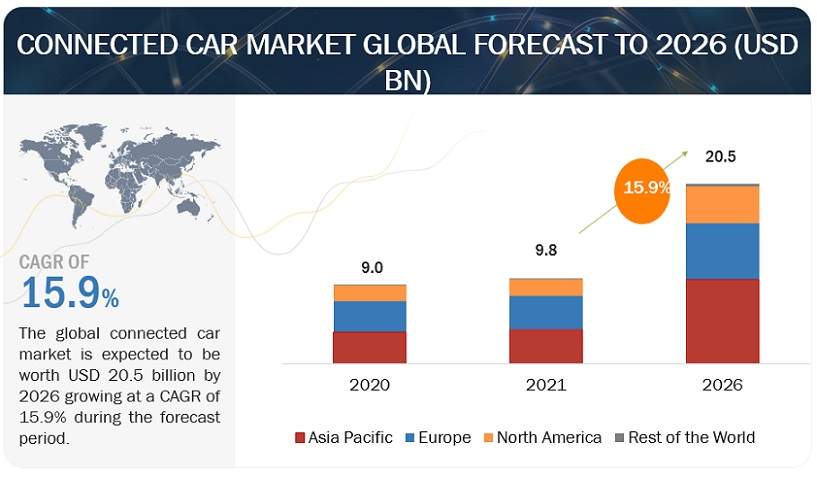The globally connected car market is estimated to grow from USD 12.4 billion in 2024 to USD 26.4 billion by 2030, at a CAGR of 13.3%.
Government initiatives towards developing intelligent transportation networks and the growing trend of in-vehicle connectivity solutions are two factors influencing the growth of the worldwide connected car market. Also, the consumer demand for a safer, more convenient, and entertaining driving experience is a significant driver. This aligns with stricter safety regulations and government support for connected car technology. Advancements in 5G infrastructure are crucial for enabling features like real-time traffic updates and autonomous driving. Consequently, the market for linked cars is anticipated to develop significantly.
ECU is the second largest market in the connected car market for hardware segment.
The Electronic Control Unit (ECU) is a critical component in the hardware of connected cars, playing a central role in managing various functions and systems within the vehicle. The importance of ECUs stems from their ability to process and control data from different sensors and subsystems, ensuring seamless operation and coordination of advanced vehicle functionalities. Modern connected cars often have multiple ECUs dedicated to specific tasks, such as engine control, transmission control, infotainment, and advanced driver-assistance systems (ADAS). For instance, the Audi A8 features over 90 ECUs that manage everything from the powertrain to the advanced safety features, illustrating the complexity and integration required for modern vehicle operation. Considering the recent developments, Robert Bosch (Germany) inaugurated a new semiconductor plant in July 2022.
Download PDF Brochure @ https://www.marketsandmarkets.com/pdfdownloadNew.asp?id=102580117
Cellular networks hold the fastest growing segment for the connected car market in the network segment.
Cellular connectivity, particularly 3G/4G and 5G, is being increasingly adopted by automakers for embedded and integrated connected car solutions due to several key advantages over DSRC. One of the main reasons is the ability to leverage existing cellular infrastructure, which allows automakers to utilize the already deployed network and avoid the costs of setting up dedicated DSRC hardware. This makes cellular a more cost-effective solution for connected car applications, as automakers can integrate the necessary modules into their vehicles. Another significant advantage of cellular connectivity is its improved safety and reliability. Cellular V2X (C-V2X) can provide greater capacity and lower the chance of interruptions in service, ensuring reliable communication for safety-critical applications. C-V2X also offers a more extensive communication range, enabling advanced applications like vehicle-to-home (V2H) and vehicle-to-cloud (V2C) communication. For example, Tesla has been using cellular connectivity to provide over-the-air updates and remote diagnostics for its vehicles, demonstrating the potential of cellular technology in enhancing the connected car experience.
North America is the second-largest region in the connected car market.
North America is the largest market for connected cars, driven by advanced technological infrastructure, a robust automotive industry presence, high consumer demand, and a supportive regulatory environment. Considering the vehicles sales in North America, the number of automobiles sold in the US rose from 14.4 million in 2022 to 16.1 million in 2023, in which premium automobile sales (E, F, and SUV – E) category sales went from 1.6 million in 2022 to 1.8 million in 2023, a rise of ~12.1%. Additionally, D-segment car sales in the US rose by 4% from 4.1 million units in 2022 to 1.5 million units in 2023. Improved cellular V2X systems, telematics systems, dynamic route optimisation, in-car Wi-Fi and internet access, and over-the-air software upgrades for sedans and premium vehicles are just a few of the technologies available in these high-end cars.
Key Players
Major manufacturers in the connected car market include Continental AG (Germany), Robert Bosch GmbH (Germany), Harman International (US), Airbiquity (US), and Visteon (US).
Request Free Sample Report @ https://www.marketsandmarkets.com/requestsampleNew.asp?id=102580117

